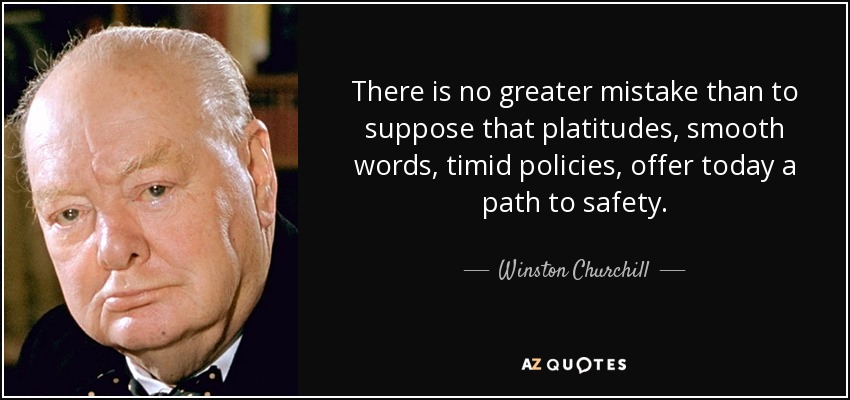Platitudes Make no Sense
 |
| Image Source |
There’s no ‘I’ in team. Hard work always pays off. Follow your passion. We’ve all heard of platitudes and-if you’re like me-they’re exasperating. At first glance, these aphorisms "feel" true as they convey a priori logic with brevity and wit. The problem, however, is that people are deceived into believing these statements because of the form of their delivery and the titans who endorse them.
Consider the idea that there’s no ‘I’ in team, for example. The spelling of the word "team" has nothing to do with sportsmanship. Literally nothing. But the message that individuals can not prioritize themselves in a team is valuable. Even so, this message is still remiss. What about people who are prioritizing the team at their own expense? What about talented but docile new recruits who are reluctant to speak up because they fear bad ideas? It’s irresponsible to assert that anything is always true, and it’s absolutely ridiculous to embellish these statements in irrelevant figurative language.
"But Adit," I hear imaginary skeptics whine. "You’re just a dumb high schooler. Plenty of successful people say stuff like this, so you must be wrong." Listen, these famous quotes memorialized in white text, on a black background, next to a grayscale of some visionary who cured cancer are not intended to be googled and noted in an internal journal of precepts. The famous quotes you find on the internet are extracted from interviews and writing, meaning they are interpreted outside of their specific context. Without the proper context, people can even be misconstrued as serial killers.
Also, it’s essential to realize that it’s impossible for platitudes to be unobjectionably true. Whenever people communicate, they make assumptions, which are usually harmless. For example, when asked your name in a casual conversation, you don’t need to specify your legal name. Why? You will probably assume that the other person doesn’t want your legal name but rather the name you prefer to be called. The person you are speaking to will also assume that you gave them your preferred name. Similarly, when Steve Jobs says, "Have the courage to follow your heart and intuition," he isn’t advising you to drop out of high school to pursue a pipedream. You need to exercise your judgement to recognize that what Steve Jobs says shouldn’t be taken verbatim. Did you really expect Steve Jobs to say something strangely specific like, "Have the courage to follow your heart and intuition, but don't risk everything. And also, remember that your heart and intuition are sometimes wrong. Thinking about it now, make sure your courage isn't recklessness as well." Jobs can't account for every contingency when he imparts wisdom. Jobs is just underscoring the value of courage and intuition.
Moreover, people need to reinforce the idea that every human is flawed. When you discover that Steve Jobs dropped out of college because he didn’t observe any value in it, but later pursued his vision to create Apple and was lauded as one of the greatest success stories of all time, you can intuit that his advice might be just a little biased. I’m not saying that Steve’s advice is invalid, but it’s far from infallible. The vast breadth of human experience combined with psychological oversights distorts everyone’s experience, including Steve’s. Sorry for picking on you, Steve.
Everything I’ve established suggests that all advice is flawed. I did a magnificent job deconstructing the ostensible sagacity of generations of luminaries, after all. Take a minute to digest that. Now, does this mean that all advice is a sham? Of course not. It just means that all advice needs to be scrutinized, which seems self-evident, but frankly isn’t practiced enough. That’s because it’s easy for us to allow our aspirations to indoctrinate us. Yeah, I’m mostly mocking the hustle culture-subscribing sigma males out there, but I’m also admonishing all of you to remember that we are perilously susceptible to succumbing to our desires.
I don’t want to conclude this article on a bad note, so I’ll provide some questions you can employ while interpreting advice, whether from a friend or a tycoon:
1. What has influenced someone to give this advice (i.e. personal experiences, biases, heuristics, etc.)?
Everyone’s paradigm is tainted by human fallibility. Go figure.
2. What does the wording of the advice tell me?
When someone says dedication instead of persistence, that distinction could mean something. Word choice matters.
3. What are some of the assumptions this advice makes and what do the assumptions tell me?
I guarantee Elon Musk has never accounted for an alien invasion. There’s almost always an assumption.
4. What are some things I could do that would disprove this advice?
Don’t actually ruin your life to spite someone’s advice. The point is to enjoy seeing how to apply the advice. You might be surprised to notice how your answers align with your behavior.
5.How can I apply this advice?
Put it all together now.
As a bonus, I’ll debunk some popular platitudes:
"What doesn’t kill you makes you stronger."
No, sometimes what doesn’t kill you can make you weaker. Not all forms of muscular atrophy are lethal. Traumatic experiences can mentally cripple people. I’m not an expert, but I don’t recommend unnecessarily hurting yourself in the pursuit of strength.
"We all die someday."
Thanks, genius. Before hearing this one, I thought I was immortal. Note that there’s no elaboration or constructive guidance regarding how to live.
"An apple a day keeps the doctor away."
Healthy people can get cancer. People can be born with congenital diseases. People can also have health check-ups. It’s more appropriate to say "An apple a day decreases your chances of seeing the doctor outside of required check-ups."
Comments
Post a Comment